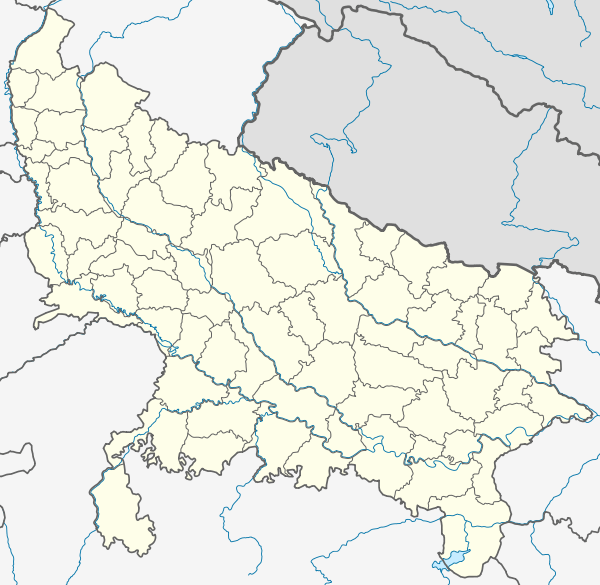Joga Musahib
| Joga Musahib Joga | |
|---|---|
| Village[1] | |
 Joga Musahib Location in Uttar Pradesh, India  Joga Musahib Joga Musahib (India) | |
| Coordinates: 25°40′14″N 83°50′55″E / 25.6704496°N 83.8487152°ECoordinates: 25°40′14″N 83°50′55″E / 25.6704496°N 83.8487152°E | |
| Country |
|
| State | Uttar Pradesh |
| District | Ghazipur |
| Population (2011) | |
| • Total | 6,000[2] |
| Languages | |
| • Official | Hindi |
| Time zone | UTC+5:30 (IST) |
| PIN | 233233[3] |
| Telephone code | 05493 |
| Vehicle registration | UP-61 |
| Distance from New Delhi | 893 kilometres (555 mi) NW (land) |
| Distance from Mumbai | 1,552 kilometres (964 mi) SW (land) |
| Distance from Chennai | 1,896 kilometres (1,178 mi) SE (land) |
| Distance from Kolkata | 713 kilometres (443 mi) (land) |
| Climate | Cfa (Köppen) |
| Precipitation | 980 millimetres (39 in) |
| Avg. annual temperature | 32.0 °C (89.6 °F) |
| Avg. summer temperature | 33.0 °C (91.4 °F) |
| Avg. winter temperature | 05 °C (41 °F) |
Joga Musahib (Hindi: जोगा मुसाहिब) is a village in the Karail area of the Mohammadabad tehsil in Ghazipur district, Uttar Pradesh, India.It has population of 3612 as per 2011 Census. The Village has a history of 570 years old. It has its own local administration under Panchayati Raj system, with Gram Pradhan as its head.There lives many families in the village.
History
The foundation of Village Joga Musahib was laid down by Babu Ram Chandra Sharma in the year of 1446 A.D. Babu Ram Chandra Sharma was one of the seventeen grandsons of Babu Nainan Shah. It was the period of Sultan Alam Shah of Sayyid dynasty, ascending the throne of Delhi, when Babu Ramchandra Sharma moved from Karimuddinpur to Joga Musahib.[4]
Babu Nainan Shah, son of Prithuraj Shah (Karimuddinpur) had seventeen grandsons through his two sons. All these seventeen grandsons established seventeen different villages in Karail Kshetra known as Sataraho (Hindi: सतरहो). These all seventeen villages are as follows;
- Karimuddinpur
- Joga Musahib
- Siyari (Siyadeeh)
- Sonari (Sonadeeh)
- Gori (Godeeh)
- Khairabaari
- Shripur
- Mundera
- Savitapur
- Sukhdehra
- Taraon
- Mirzabad
- Mania
- Gharjoori
- Lochine
- Dahinavar
- Macha
[4] 'Sataraho' branch of Kinwar clan has one very glorious chapter within its fold. One of young member of Babu Sangram Rai family of 'Sonari' who was a cavalry officer in Tughulaq Army, showed remarkable bravery in war with Bengal rebels. He was bestowed a jagir in Singhabad of Malda district. Later on 'Raja Bhairvendra Narayan Roy' of Singhabad (Malda) earned much reputation during freedom struggle of India.[4]
Administration
Joga Musahib comes under Mohammadabad assembly seat of Ballia Lok Sabha constituency.However the Tehsil under which it is administered is Mohammadabad, comes under Ghazipur district.
Gram Panchayat
Village Joga Musahib has its own Panchayat which looks after welfare of the village. Current pradhan of Joga Panchayat is Shrimati Shweta Rai.
School and temple
This village has one Intermediate College along with one primary pathshala. In the center of the village there is one famous temple of Jogi Bir baba. Villagers worship him as gram devta.Its a nice place.
Transportation
The village is at a distance of nearly 33 km from Ghazipur city Railway station and UP Roadways Ghazipur depot. Other nearby railway stations are Karimuddinpur, Yusufpur and Buxar railway station. Joga Musahib can be reached through road transport by mean of private vehicles or rented vehicles, such as buses and Taxies.
Language and culture
Language spoken by majority in the village is a mix of Bhojpuri and Hindi. Culturally the area is much influenced by Ballia which is a major cultural center nearby.
Nearby places
References
- ↑ "Joga Musahib Pin Code, Joga Musahib, Ghazipur Map, Latitude and Longitude, Uttar Pradesh". Indiamapia.com. Retrieved 2012-04-07.
- ↑ "Sub_Districts_Master". Censusindia.gov.in. Archived from the original on 2015-02-09. Retrieved 2012-04-07.
- ↑ "Pincode: Khardiha, Ghazipur, Uttar Pradesh | Post Office address Khardiha, Uttar Pradesh". IndiaPinCode.in. Retrieved 2012-04-07.
- 1 2 3 Evolution and Spatial Organization of Clan Settlements (1986), S. H. Ansari, Concept Publishing Company